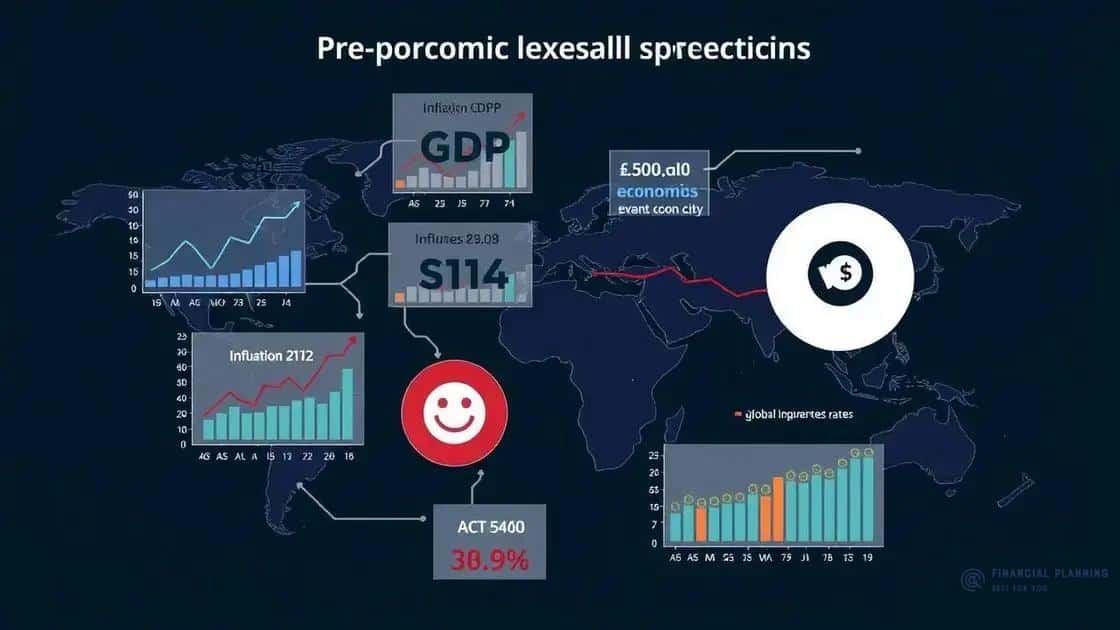Vanguard lowers its economic growth outlook for 2025

Vanguard has lowered its economic growth outlook for 2025, prompting investors to adjust strategies by monitoring economic indicators and preparing for potential market shifts to protect their portfolios.
Vanguard lowers its economic growth outlook for 2025, and this change could impact how we view our financial future. Have you considered how these forecasts might influence your investment decisions?
Understanding Vanguard’s growth forecasts
Understanding Vanguard’s growth forecasts can provide valuable insights into the economic landscape. As one of the leading investment management firms, Vanguard’s predictions are anticipated by investors and analysts alike. These forecasts are grounded in extensive research and analysis, reflecting both global and national economic trends.
Key Elements of the Forecasts
The forecasts issued by Vanguard consider multiple factors that impact economic growth. These elements include fiscal policies, market dynamics, and international developments. By understanding these components, investors can make better-informed decisions.
- Economic indicators: Metrics such as GDP growth, unemployment rates, and consumer spending.
- Historical trends: Past economic performance and how it may inform future predictions.
- Global events: Factors like trade agreements and geopolitical shifts that could influence the economy.
Additionally, Vanguard analyzes various asset classes, providing recommendations on how to allocate investments effectively. The firm’s research highlights the importance of diversification and risk management strategies. Investors are encouraged to consider both short-term volatility and long-term growth potential when making decisions.
Implications for Investors
Understanding these forecasts also means recognizing their implications for investment strategies. As Vanguard lowers its economic growth outlook for 2025, stakeholders should evaluate their portfolios and adjust accordingly. Staying informed about these changes can help maintain optimal investment performance.
Ultimately, a deep dive into Vanguard’s forecasts illuminates not just what is expected economically, but also how individuals and businesses can align their strategies with these insights. Taking proactive steps based on research ensures that investors are prepared for shifts in the market.
Key factors influencing economic predictions

Several key factors influence economic predictions made by firms like Vanguard. These factors shape forecasts and provide a clearer picture of future economic conditions. Analyzing these elements can help investors make informed decisions.
Economic Indicators
One of the primary factors is economic indicators. These include statistics that reflect the state of the economy. By monitoring these indicators, analysts can gauge economic health.
- Gross Domestic Product (GDP): A critical measure of economic output.
- Unemployment Rate: Indicates workforce health and spending potential.
- Inflation Rate: Affects purchasing power and consumer confidence.
These indicators often intertwine, creating a complex web that influences how forecasts are developed. As conditions shift, the interpretations of these indicators also evolve.
Global Events
Global events play a significant role in shaping economic predictions. From trade policies to geopolitical tensions, these factors can change economic stability. For instance, a trade agreement may boost economic confidence, while international conflicts may lead to uncertainty.
Furthermore, central bank policies impact interest rates and investment decisions. When rates change, consumer spending is affected, which in turn influences economic growth. Understanding these factors allows investors to anticipate shifts in the market.
Overall, comprehending the key factors that affect economic predictions equips individuals with the knowledge necessary to navigate the investment landscape. By staying informed about these elements, investors can create strategies that align with evolving economic conditions.
Implications for investors and markets
The implications for investors and markets from Vanguard’s lowered economic growth outlook are significant. Understanding these implications is essential for making informed investment choices. As forecasts shift, so do the strategies that investors need to employ to navigate the changing landscape.
Investment Strategy Adjustments
One key implication is the need for investors to adjust their investment strategies. When growth expectations decrease, it may be wise to reconsider asset allocation. A more conservative approach could protect portfolios from potential downturns.
- Emphasis on safety: Consider increasing holdings in bonds or stable dividend-paying stocks.
- Sector rotation: Identify sectors likely to perform during economic slowdowns, such as utilities and consumer staples.
- Diversification: Spread investments across different asset classes to mitigate risk.
Investors may also need to monitor economic indicators more closely. As conditions evolve, being proactive can make a significant difference. For example, tracking interest rates and inflation trends will be crucial in adapting to market changes.
Market Reactions
Market reactions to revised growth forecasts are also noteworthy. A lower growth outlook might lead to increased volatility as traders adjust their expectations. Fear and uncertainty can drive market swings, impacting stock prices and investment values.
Understanding how headlines around economic forecasts influence market sentiment is vital. Investors should be prepared for potential short-term fluctuations while keeping long-term goals in sight. Staying informed allows for more strategic decision-making amid the noise.
In summary, comprehending the implications of Vanguard’s economic predictions helps investors navigate the complexities of the market. Making informed choices in response to these forecasts can empower investors to protect and potentially grow their wealth.
Comparing forecasts with other financial institutions

Comparing forecasts from different financial institutions can provide valuable insights for investors. Each organization has its own methods and assumptions, which can lead to diverse predictions about economic growth. Understanding these differences can help in making informed investment choices.
Diversity in Economic Models
Different firms utilize varying economic models to generate their forecasts. These models are based on unique data sets and analytical techniques. For example, Vanguard might emphasize factors like consumer spending and employment rates, while another institution could focus on international trade patterns.
- Assumptions: Each forecast is based on specific assumptions about the economy.
- Data sources: Institutions may rely on different economic indicators.
- Time horizons: Forecasts can vary based on the period they cover, with some focusing on short-term trends and others on long-term projections.
By comparing these forecasts, investors can gauge the consensus view or identify outlier predictions. Understanding where institutions agree or differ helps investors assess potential risks and opportunities in the market.
Impact of Global Events
Another critical aspect to consider is how global events affect forecasts across institutions. Trade disputes, political changes, and natural disasters can drastically alter economic expectations. For instance, if one organization predicts slowing growth due to rising tariffs while another remains optimistic, it raises questions about stability.
Monitoring these varied predictions enables investors to adapt their strategies. Staying informed about how external events influence forecasts empowers individuals to position their portfolios for better performance amid uncertainty. This awareness fosters more resilient investment approaches.
In summary, analyzing and comparing forecasts from various institutions sheds light on the range of possible economic scenarios. Such insights are crucial for investors striving to navigate an ever-changing financial landscape.
Preparing for potential market shifts
Preparing for potential market shifts is essential for investors looking to protect and grow their portfolios. As economic forecasts change, being proactive can make a significant difference in investment strategies. Understanding how to adapt can help you manage risks effectively.
Identifying Signs of Change
Investors should continually monitor for signs that indicate potential shifts in the market. These signs can range from economic reports to shifts in market sentiment. Key indicators include:
- Economic indicators: Tracking GDP growth, inflation rates, and unemployment figures.
- Market trends: Analyzing stock and bond market performance for sudden changes.
- Global events: Keeping an eye on geopolitical developments and their economic impacts.
By paying attention to these signs, you can adjust your investment approach before changes take full effect.
Developing a Flexible Investment Strategy
A key aspect of preparing for market shifts is having a flexible investment strategy. This means being ready to alter your asset allocation based on changing conditions. Many investors find it helpful to maintain a mix of asset classes that can perform differently under various scenarios.
This diverse approach provides a buffer against losses. Allocating funds across stocks, bonds, and alternative investments can enhance resilience. Additionally, rebalancing your portfolio periodically ensures that it aligns with your current risk tolerance and market conditions.
In volatile markets, having a clear exit strategy is also vital. If certain investments are underperforming, knowing when to cut losses can save capital for more promising opportunities. Building a comprehensive plan and regularly revisiting it will help you stay prepared.
Ultimately, being proactive and adaptable in your investment strategy helps manage uncertainty as economic conditions evolve. This preparation can position you to capitalize on new opportunities while safeguarding your investments.
In conclusion, understanding Vanguard’s revised economic growth outlook for 2025 highlights the importance of being adaptable as an investor. The need to monitor key economic indicators, adjust investment strategies, and compare forecasts from various institutions is crucial. By preparing for potential market shifts and staying informed, investors can not only protect their assets but also seize new opportunities. Being proactive in these uncertain times can make all the difference in achieving financial goals.
FAQ – Frequently Asked Questions about Vanguard’s Economic Growth Outlook
What is Vanguard’s revised economic growth outlook for 2025?
Vanguard has lowered its economic growth outlook for 2025, indicating potential challenges in the economic environment.
How can investors prepare for market shifts?
Investors can prepare by monitoring economic indicators, adjusting their investment strategies, and staying informed about global events.
Why is it important to compare forecasts from different financial institutions?
Comparing forecasts helps identify varying perspectives on economic conditions, allowing investors to assess risks and opportunities more effectively.
What are key economic indicators to watch?
Important economic indicators include GDP growth, inflation rates, employment figures, and market trends.





